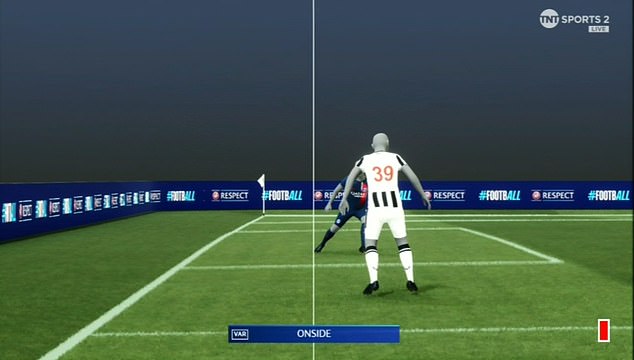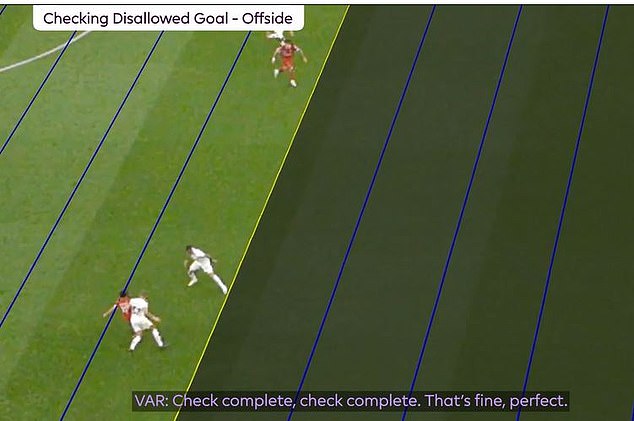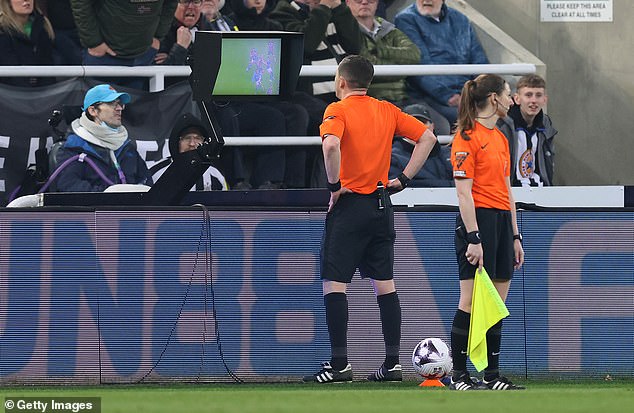Premier League clubs vote unanimously for major new change to the offside rule – but it WON’T be ready for the start of next season
English football will embrace semi-automatic offside technology from next season, with the system expected to reduce VAR delays by around 30 seconds.
Premier League clubs voted unanimously on Thursday to introduce the new device, which has been successfully deployed in European club competition and other top-five competitions.
However, there will be further delays in the arrival of the semi-automatic offside technology (SAOT), which will only be rolled out after ‘one of the international autumn breaks’.
Mail Sport understands the delay is as league leaders want to ensure there are no glitches in the system when it is launched. The current ‘crosshair’ system – lines drawn on a screen to determine the position of the relevant players – will remain available if necessary.
A Premier League spokesperson said: ‘The technology will provide faster and more consistent placement of the virtual offside line, based on optical player tracking, and will produce high-quality broadcast images to ensure an enhanced stadium and broadcast experience for supporters. ‘
The way offside calls are made will change in the Premier League from next season

Semi-automated offside technology has been used in European club competitions and in other top European competitions, and is now coming to the Premier League
The league knows they can’t afford to mess this up, which seems to be the cause of the uncertainty surrounding the start date.
Fans, players and managers have been lukewarm at best towards VAR since its introduction for the 2019-20 season, with slow decision-making and lack of information on the pitch a particular bugbear.
Speaking last autumn, England manager Gareth Southgate suggested it would be better to scrap the whole thing – although that is virtually impossible now that the genie is out of the bottle.
Extensive testing and analysis has already been carried out this season and Premier League chiefs hope the process will run much smoother from the autumn. Based on these tests, VAR delays are believed to have been reduced by an average of 31 seconds.
When the message ‘VAR checks goal’ flashes on big screens, supporters of both sides groan and it remains to be seen whether quicker resolution of controversial decisions will make them happier.
Semi-automated offside technology was first used by FIFA during the 2022 World Cup in Qatar.
Its use was widely praised, with offside calls often made quickly and causing minimal disruption to the flow of play.
Many expected it would be a formality for the Premier League to introduce this to English football last year, but they decided against introducing the technology.
Instead, they chose to focus on providing additional VAR cameras in an effort to reduce controversial calls.
But there have still been a number of high-profile offside calls that have sparked debate this mandate.
The most memorable came during Liverpool’s visit to Tottenham in September, when Luis Diaz had a goal disallowed despite being clearly offside.
The VAR for that match, Darren England, wrongly thought the goal had been given on the pitch and ended his check, only to realize the offside flag had actually been raised.

Luis Diaz was wrongly ruled offside by VAR Darren England earlier this season as he cost Liverpool a goal against Tottenham

Wolves boss Gary O’Neil was also outraged by an offside signal that went against his side last weekend, but that was a subjective decision that would not be changed by semi-automated technology

Referees will still have the final say on offside calls where there is a subjective element
He did not intervene when play resumed, and Liverpool did not get the goal as they lost 2–1 after a last-minute own goal from Joel Matip.
It is hoped that semi-automated technology will increase confidence in decision-making and ensure offside is not missed by VAR.
It is understood the technology has been extensively tested this season and the aim is for it to be used for a number of FA Cup matches next season, including the semi-finals and the final at Wembley.
Referees will still have the final say on decisions involving a subjective element, such as whether a player in an offside position is interfering with play or not.
Wolves boss Gary O’Neil was left furious by an offside decision against his side last weekend when Max Kilman’s 99th-minute equalizer against West Ham was disallowed because Tawanda Chirewa was offside and deemed to be obstructing goalkeeper Lukasz Fabianski’s view. .
Fabianski’s vision seemed slightly blurred, but it seemed highly unlikely that he would have saved Kilman’s attempt.
However, referee Tony Harrington decided to disallow the goal. This was not a case of VAR technology not working, but a judgment call by the refereeing team, and the introduction of semi-automated technology would not change this.
